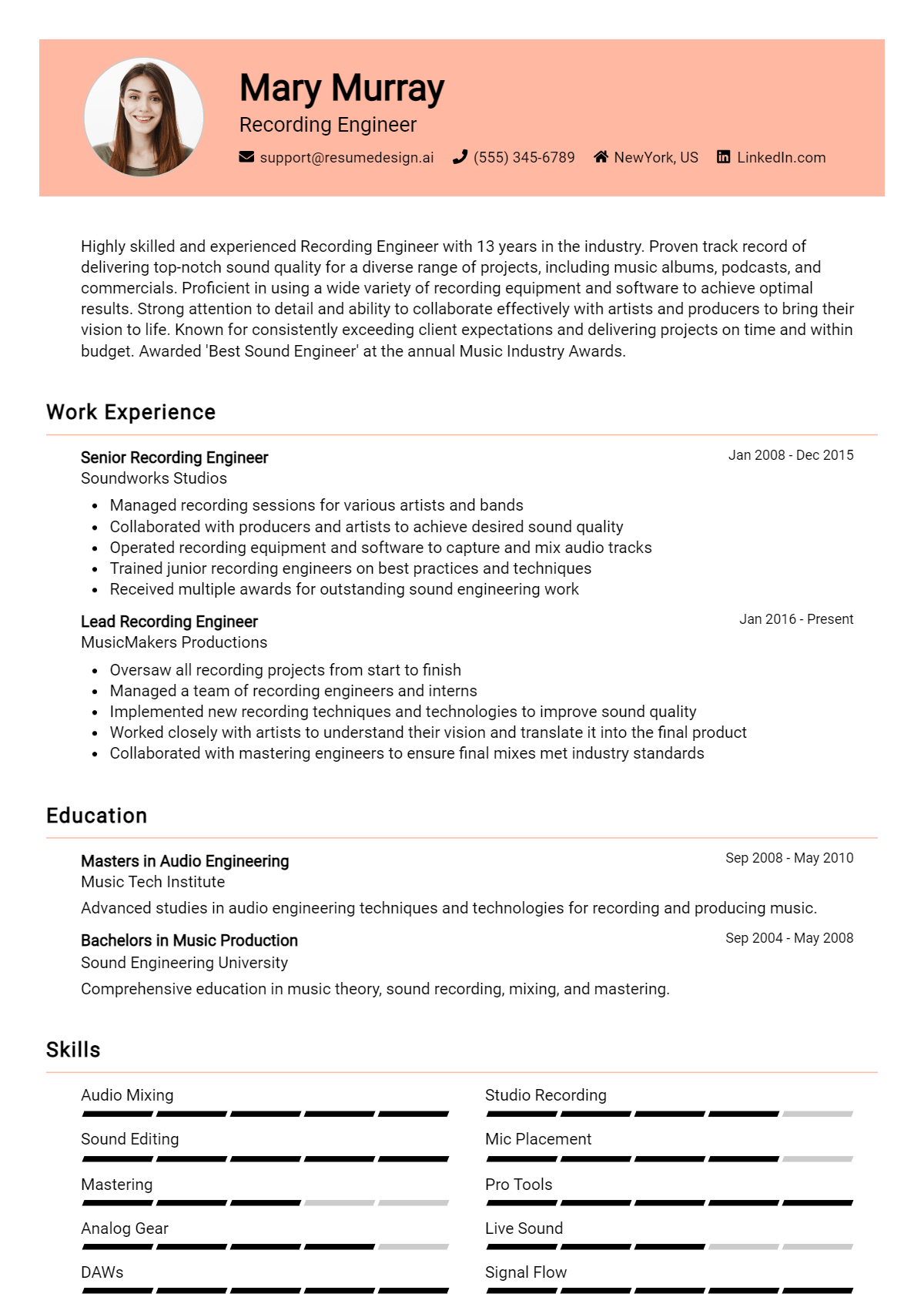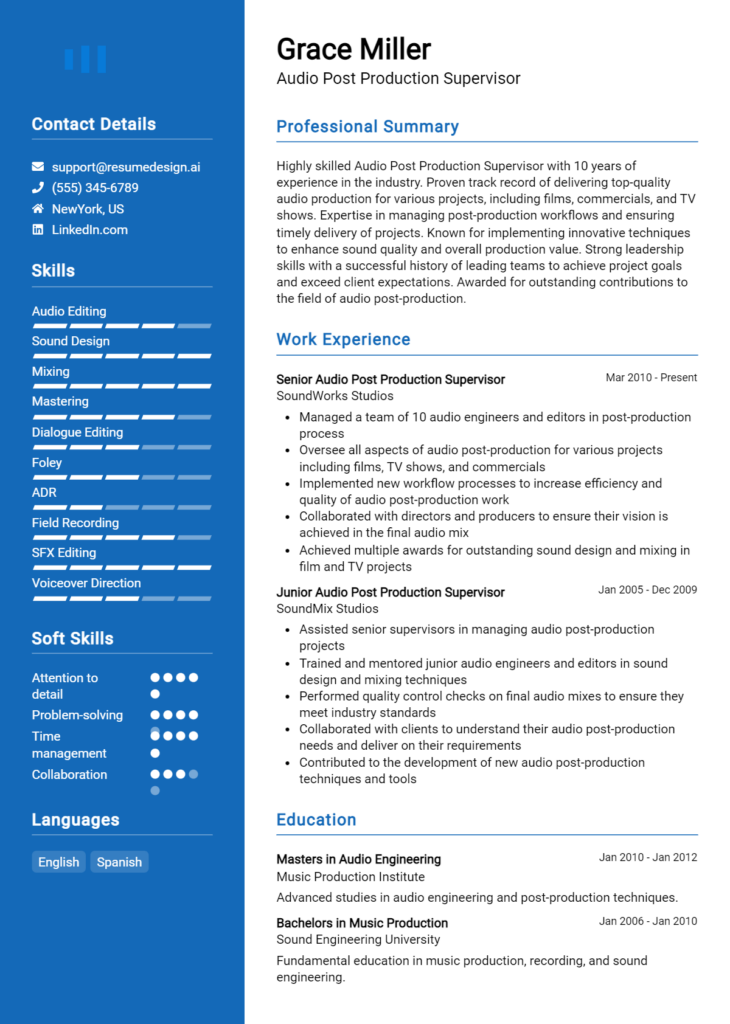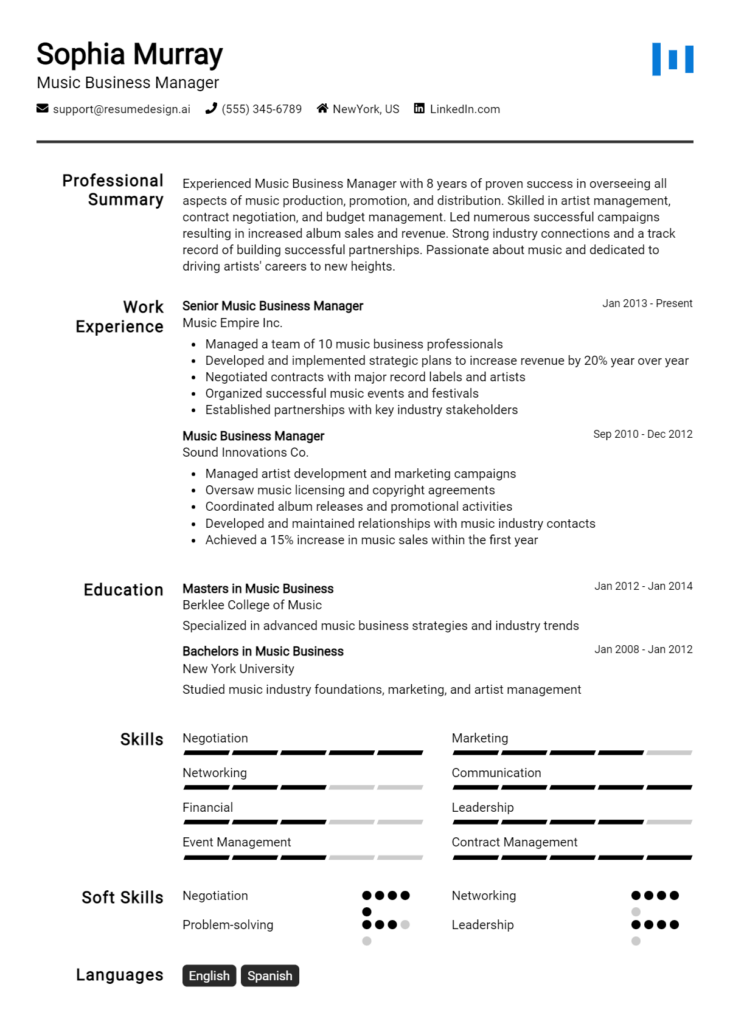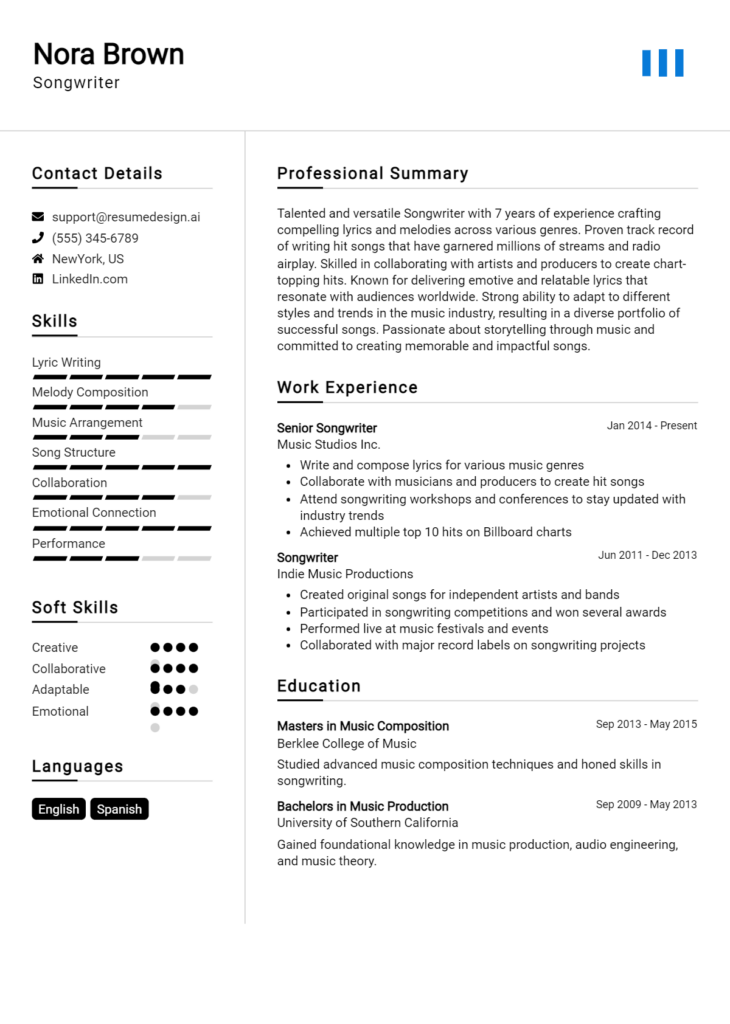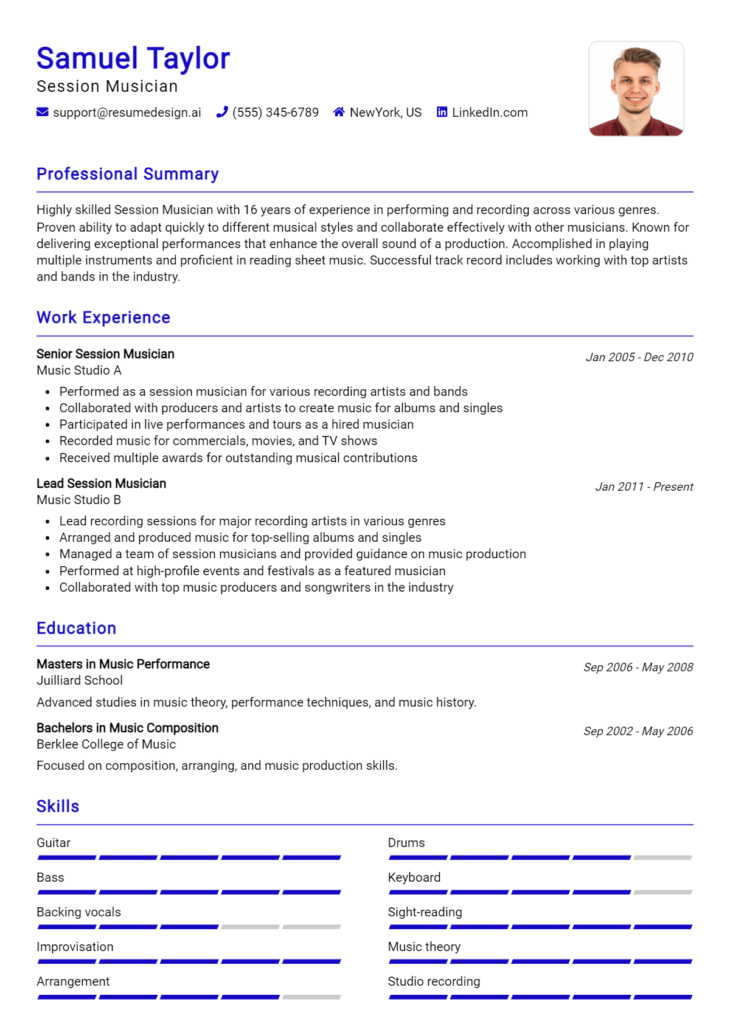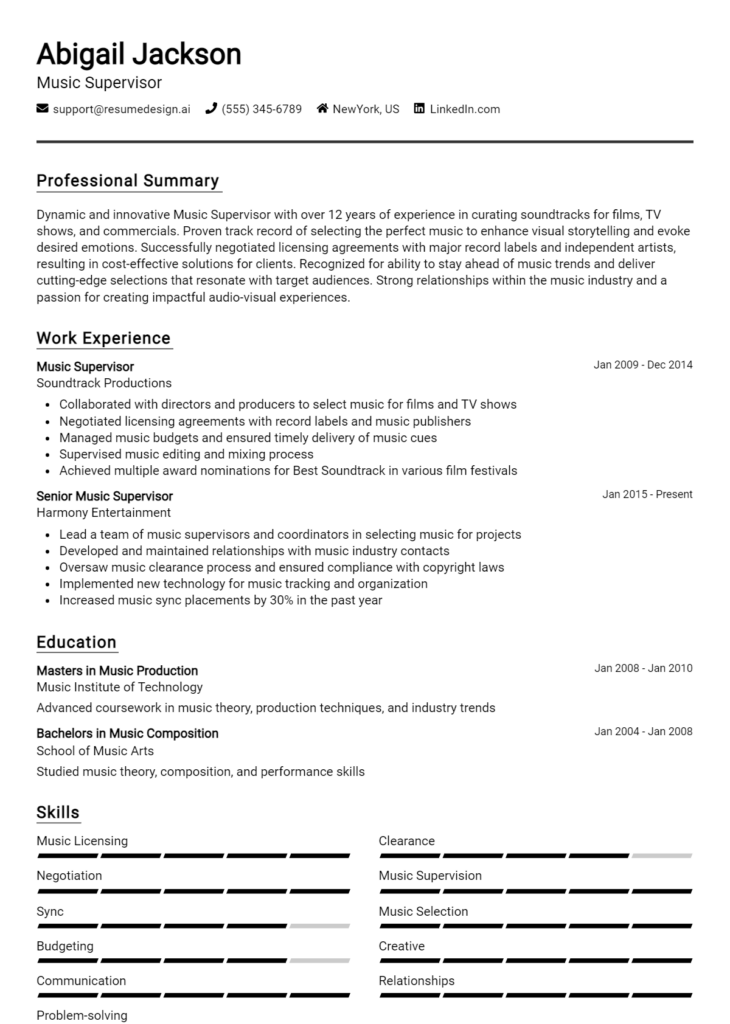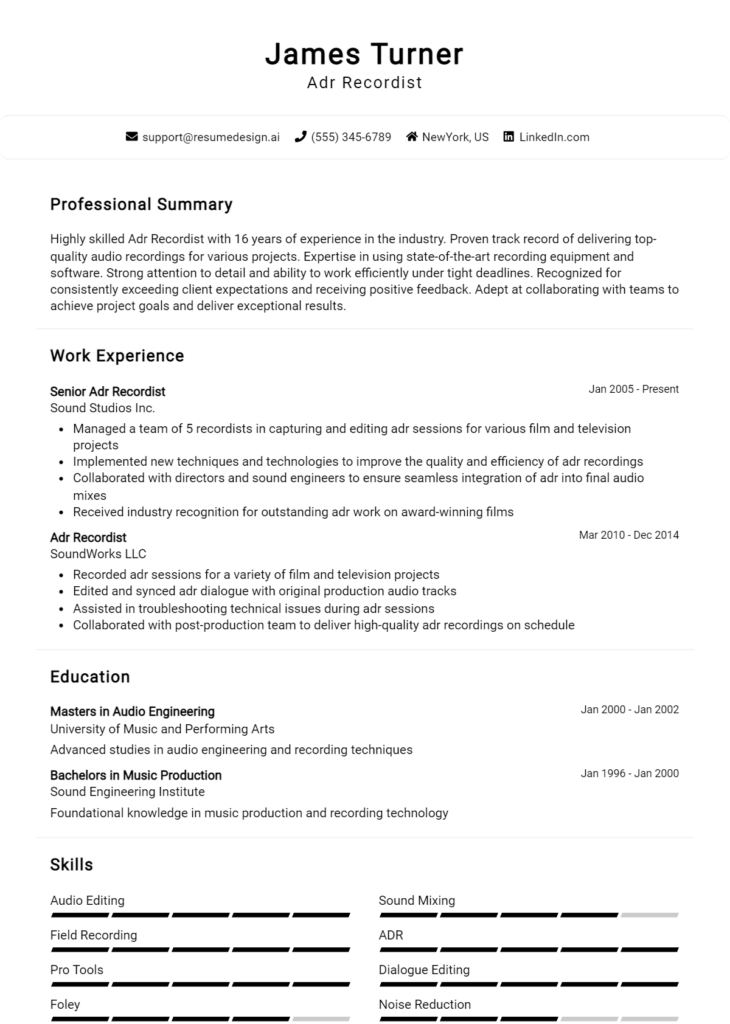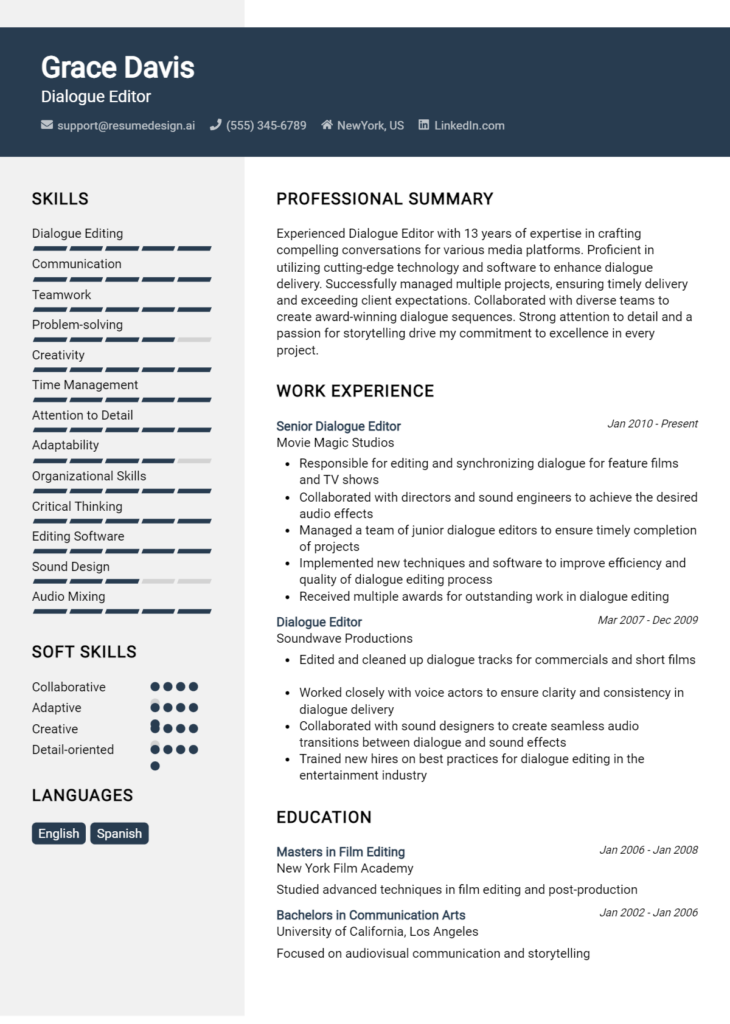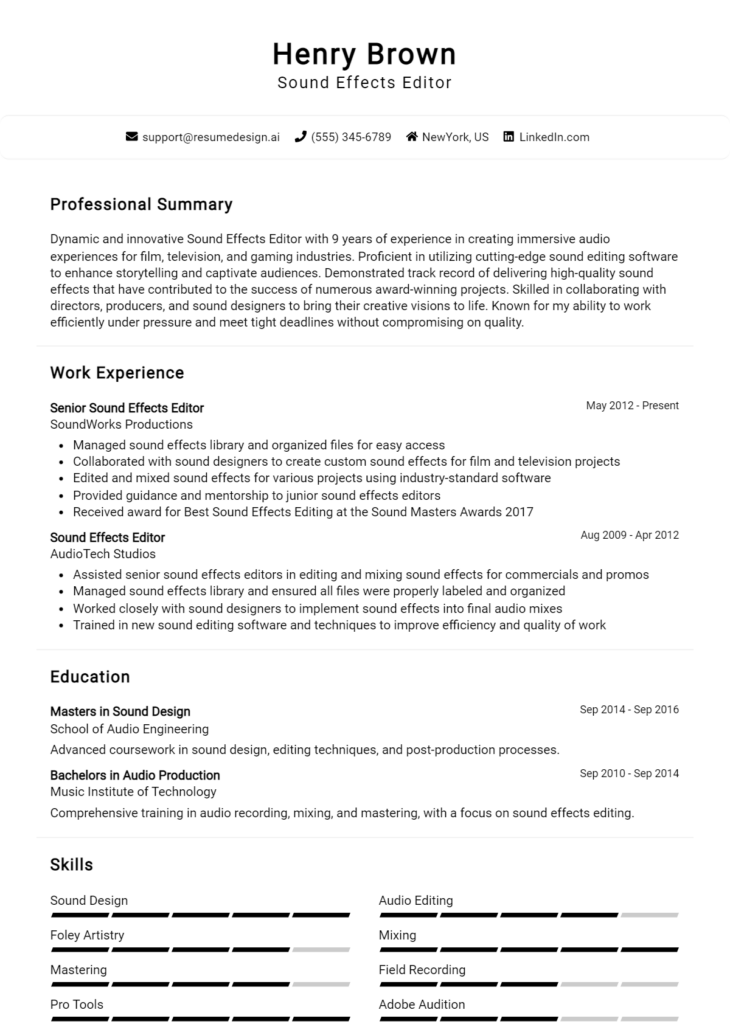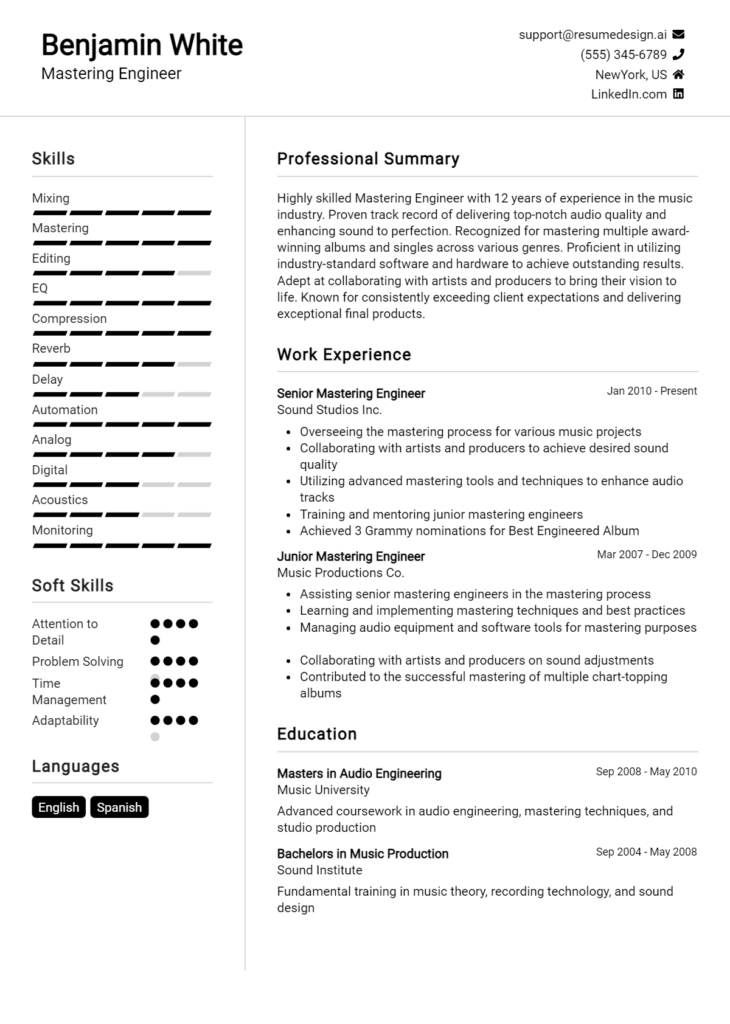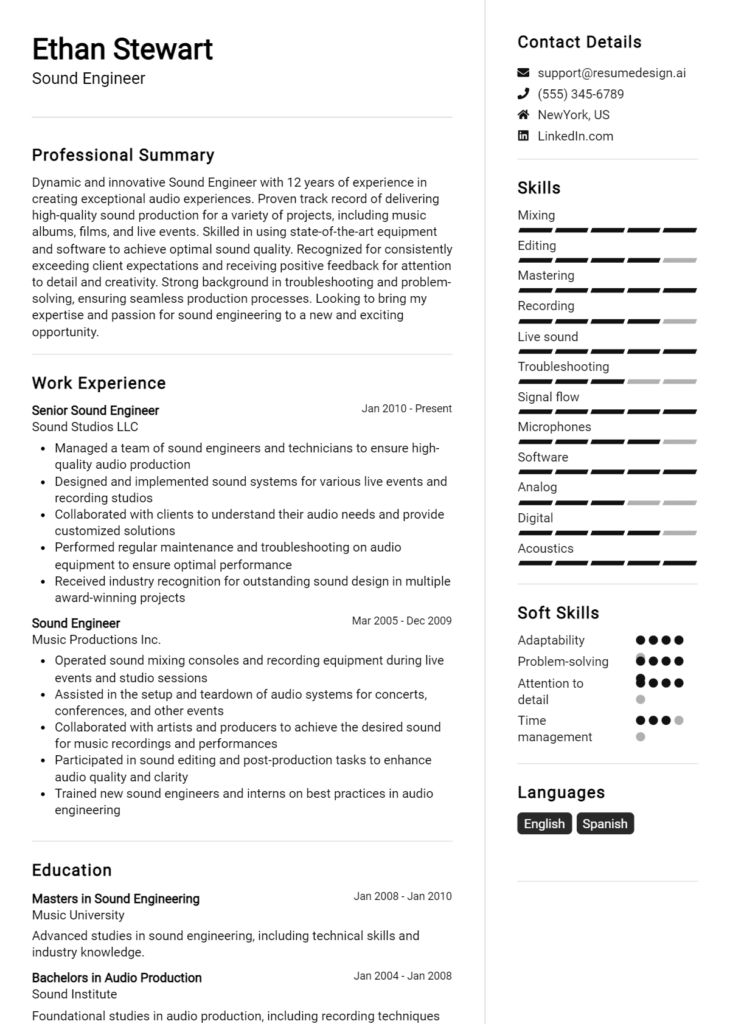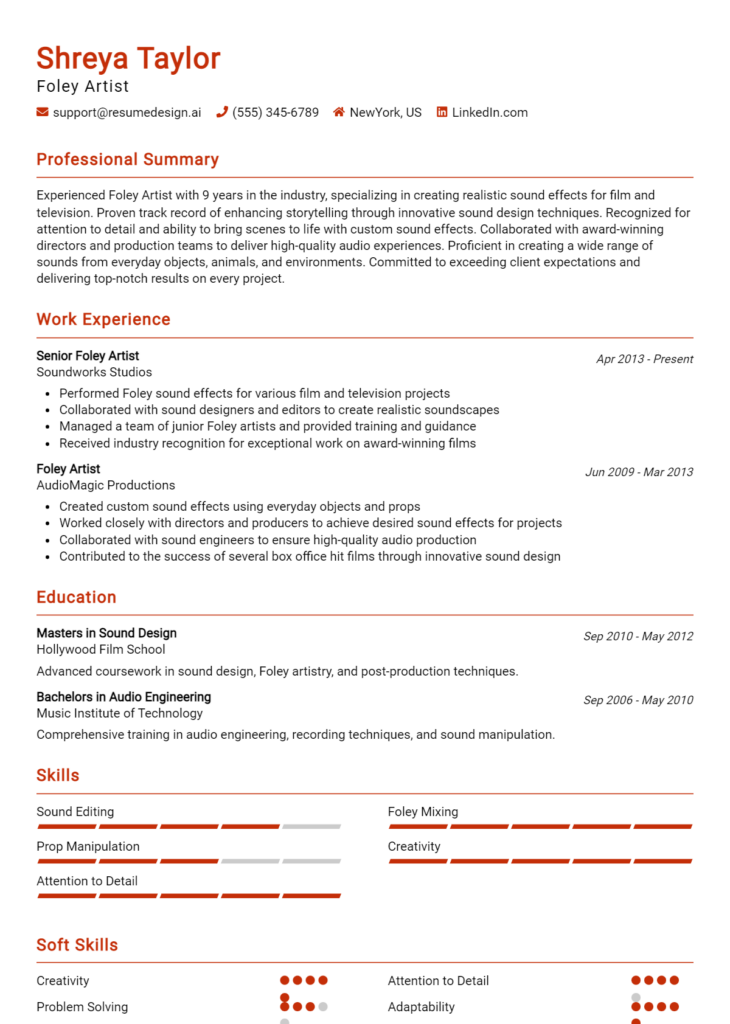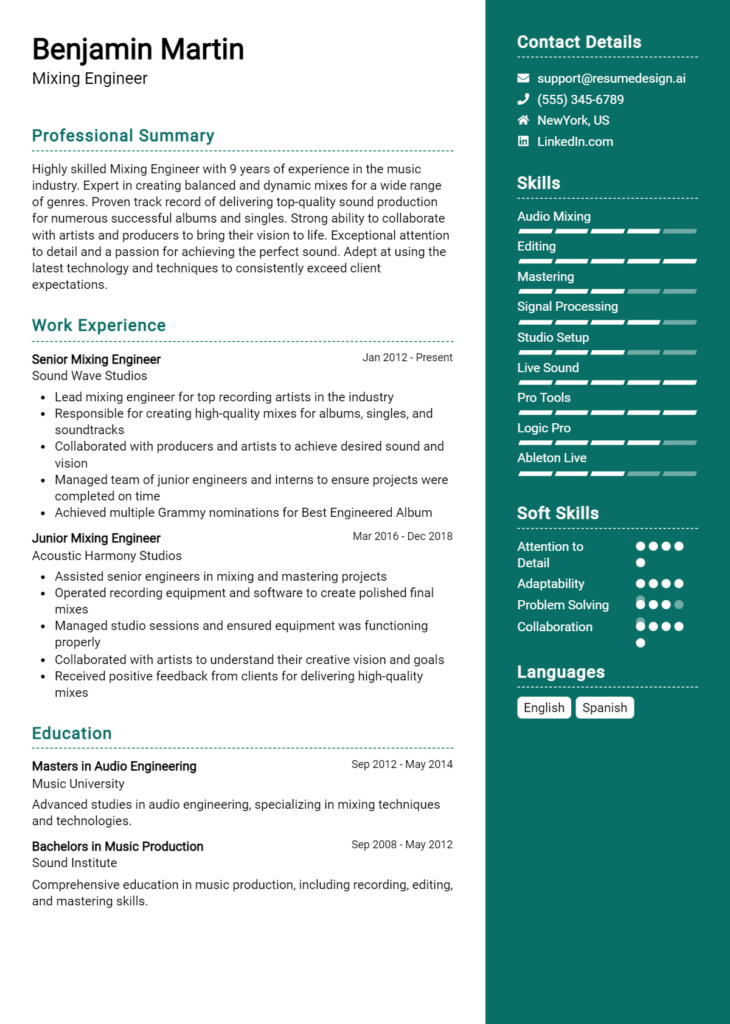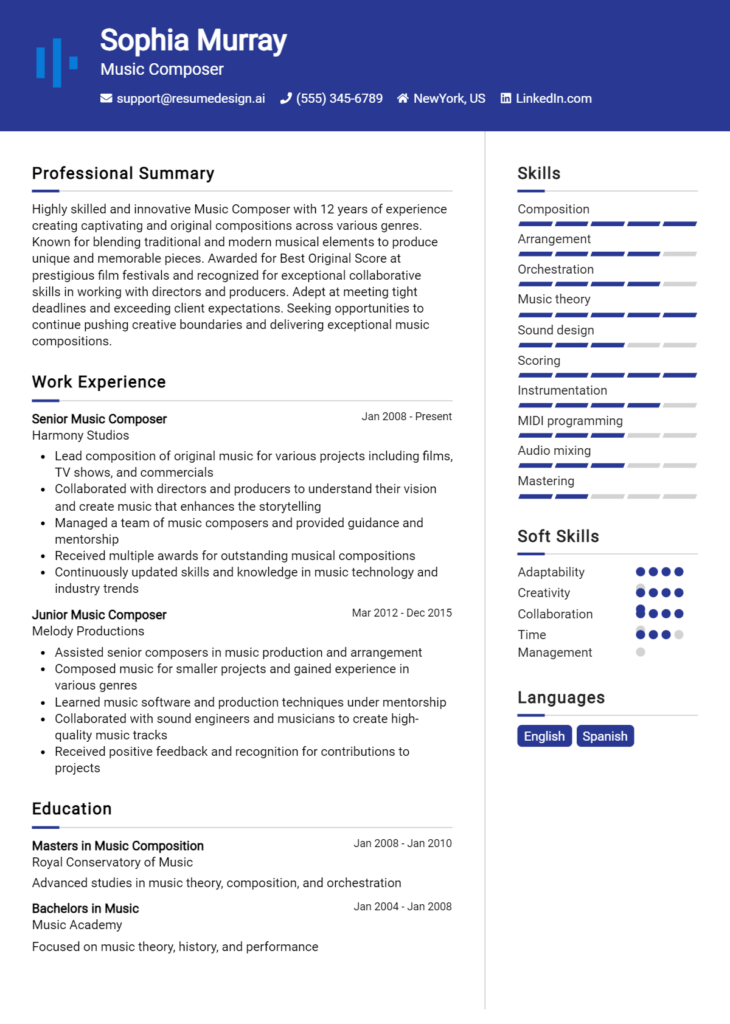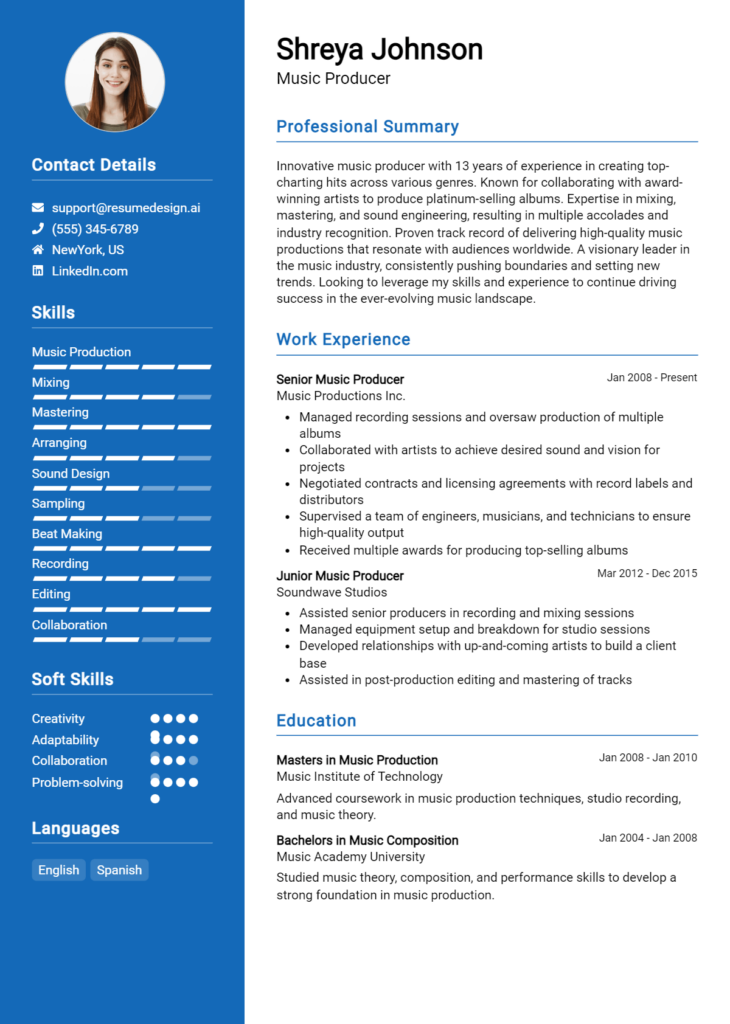Recording Engineer Core Responsibilities
A Recording Engineer plays a crucial role in the music production process, bridging the gap between artists, producers, and technical staff. Key responsibilities include setting up recording equipment, capturing sound, and mixing audio tracks. Essential skills encompass technical proficiency with recording software, operational knowledge of sound equipment, and strong problem-solving abilities. These competencies contribute significantly to the organization’s overall goals, ensuring high-quality audio output. A well-structured resume can effectively highlight these qualifications, making candidates stand out in a competitive field.
Common Responsibilities Listed on Recording Engineer Resume
- Setting up and operating recording equipment
- Recording audio tracks for various projects
- Mixing and editing sound to achieve desired quality
- Collaborating with artists and producers to realize their vision
- Troubleshooting technical issues during recording sessions
- Maintaining and managing studio equipment
- Ensuring proper acoustics and sound quality in recording environments
- Documenting session notes and track details
- Staying updated on industry trends and technology
- Assisting in mastering final audio for distribution
- Creating and managing session files for easy access
- Coordinating with different departments for seamless production
High-Level Resume Tips for Recording Engineer Professionals
A well-crafted resume is crucial for Recording Engineer professionals, as it serves as the first impression a candidate makes on potential employers. In a highly competitive industry, your resume must not only showcase your technical skills and achievements but also reflect your creative flair and understanding of sound engineering. A strong resume can set you apart, highlighting your unique qualifications in a way that resonates with hiring managers. This guide will provide practical and actionable resume tips specifically tailored for Recording Engineer professionals, ensuring that you effectively communicate your value in this dynamic field.
Top Resume Tips for Recording Engineer Professionals
- Tailor your resume to each job description by incorporating relevant keywords and phrases that match the requirements of the position.
- Showcase your experience with various recording software and equipment, as well as any specialized training or certifications you have obtained.
- Quantify your achievements by including specific metrics, such as the number of projects completed, tracks mixed, or artists collaborated with.
- Highlight your understanding of different music genres and styles, showcasing any versatility that may appeal to a broader range of employers.
- Include a section for notable projects, detailing your role and contributions to each project, along with any accolades or recognition received.
- Demonstrate your problem-solving skills by including examples of challenges faced in the studio and the innovative solutions you implemented.
- Utilize a clean and professional layout that reflects your attention to detail, using headers and bullet points for easy readability.
- Incorporate a brief personal statement or summary at the top that highlights your passion for sound engineering and your career goals.
- Network and seek endorsements from industry professionals, and consider including testimonials or references that validate your skills and work ethic.
By implementing these tips, you can significantly increase your chances of landing a job in the Recording Engineer field. A resume that effectively showcases your skills, experience, and accomplishments will not only capture the attention of hiring managers but also position you as a compelling candidate in a competitive job market.
Why Resume Headlines & Titles are Important for Recording Engineer
In the competitive field of audio engineering, a well-crafted resume headline or title can serve as the first point of contact between a candidate and a potential employer. For a Recording Engineer, the headline should encapsulate their unique qualifications and expertise in a succinct manner. A strong headline has the power to immediately grab the attention of hiring managers, offering a snapshot of the candidate's skills, experience, and professional focus. It should be concise, relevant, and directly related to the job being applied for, setting the tone for the rest of the resume and making a memorable impression.
Best Practices for Crafting Resume Headlines for Recording Engineer
- Keep it concise: Aim for a headline that is no more than 10-12 words.
- Make it role-specific: Include relevant terms that align with the Recording Engineer position.
- Highlight key strengths: Focus on your most impressive qualifications or experiences.
- Use action words: Start with strong verbs to convey your capabilities effectively.
- Be unique: Avoid clichés and generic phrases to stand out from the competition.
- Tailor to the job description: Customize your headline for each application to reflect the specific requirements of the role.
- Incorporate relevant skills: Mention technical skills or software expertise that are pertinent to the position.
- Showcase accomplishments: If applicable, include quantifiable achievements that illustrate your impact in previous roles.
Example Resume Headlines for Recording Engineer
Strong Resume Headlines
“Innovative Recording Engineer with 10+ Years of Experience in Music Production”
“Detail-Oriented Audio Engineer Specializing in High-Quality Mixing and Mastering”
“Award-Winning Recording Engineer with Expertise in Live Sound and Studio Production”
Weak Resume Headlines
“Engineer Looking for Opportunities”
“Music Professional”
Strong headlines are effective because they are specific, informative, and tailored to the role, providing a clear indication of the candidate's expertise and immediately conveying their value to potential employers. In contrast, weak headlines fail to impress because they lack specificity and do not highlight what makes the candidate unique, ultimately blending in with a sea of generic resumes and missing the opportunity to capture the hiring manager’s attention.
Writing an Exceptional Recording Engineer Resume Summary
A resume summary is a crucial component for a Recording Engineer as it serves as the first impression to hiring managers. A well-crafted summary swiftly highlights key skills, experience, and accomplishments, allowing candidates to stand out in a competitive job market. By providing a concise and impactful overview tailored to the specific job, candidates can effectively showcase their expertise in audio engineering, production techniques, and collaboration with artists and producers. This targeted approach not only captures attention but also sets the tone for the rest of the resume, making it an essential element for success.
Best Practices for Writing a Recording Engineer Resume Summary
- Quantify achievements: Use numbers to demonstrate your impact in previous roles.
- Highlight core skills: Focus on essential technical and soft skills relevant to audio engineering.
- Tailor the summary: Customize your summary for each job application to align with the job description.
- Be concise: Keep it brief, ideally 2-4 sentences, to maintain the hiring manager's interest.
- Use industry terminology: Incorporate relevant jargon and terminology to demonstrate your expertise.
- Show passion for music: Convey your enthusiasm for music and sound production to connect with hiring managers.
- Include relevant software: Mention proficiency in audio software and equipment to highlight technical capabilities.
Example Recording Engineer Resume Summaries
Strong Resume Summaries
Results-driven Recording Engineer with over 6 years of experience in studio and live sound production. Successfully engineered and mixed tracks for 50+ artists, resulting in 10 chart-topping singles. Proficient in Pro Tools and Logic Pro, with a strong background in audio editing and sound design.
Detail-oriented Recording Engineer with expertise in acoustics and sound reinforcement. Played a vital role in producing a Grammy-nominated album that sold over 500,000 copies. Skilled in collaborating with musicians to achieve optimal sound quality and artistic vision.
Creative and passionate Recording Engineer with a proven track record of enhancing audio quality for various genres. Managed the entire recording process for 20+ projects, increasing client satisfaction ratings by 30%. Adept at using cutting-edge recording technologies and software.
Weak Resume Summaries
Experienced audio engineer looking for a job in recording. I have worked with various artists and enjoy music.
Recording Engineer with a background in sound production. I am interested in applying my skills to new projects and learning more about the industry.
The strong resume summaries are considered effective because they clearly quantify achievements, specify relevant skills, and demonstrate direct relevance to the Recording Engineer role. Each summary articulates measurable results, showcases technical proficiency, and conveys a passion for music, thereby capturing the attention of hiring managers. In contrast, the weak summaries lack detail, specificity, and quantifiable outcomes, rendering them too generic and less impactful in differentiating the candidate from others.
Work Experience Section for Recording Engineer Resume
The work experience section of a Recording Engineer resume is a critical component that delineates the candidate's professional journey and technical proficiency within the audio production realm. This section not only highlights the candidate's hands-on experience with recording equipment and software but also showcases their ability to manage teams, coordinate projects, and deliver high-quality audio products. By quantifying achievements—such as the number of successful projects completed, client satisfaction ratings, or improvements in sound quality—candidates can align their experience with industry standards. This alignment is crucial for standing out in a competitive field where technical skills and collaborative efforts are paramount.
Best Practices for Recording Engineer Work Experience
- Highlight specific audio technologies and software you are proficient in.
- Quantify achievements with metrics such as project turnaround time or client satisfaction scores.
- Detail your role in collaborative projects, emphasizing teamwork and leadership.
- Include any relevant certifications or training related to audio engineering.
- Showcase a variety of projects—such as studio recordings, live sound, or post-production work.
- Use action verbs to describe your contributions and impact on projects.
- Align your experiences with the requirements listed in job descriptions.
- Provide context for your achievements, explaining the challenges faced and solutions implemented.
Example Work Experiences for Recording Engineer
Strong Experiences
- Led a team of 5 engineers to successfully record and produce a 10-track album, achieving a 20% increase in client satisfaction ratings compared to previous projects.
- Implemented a new digital audio workstation (DAW) system that reduced post-production time by 30%, resulting in faster project delivery and increased revenue.
- Collaborated with artists and producers to deliver high-quality sound for live events, maintaining a 95% client retention rate over three years.
- Managed the audio setup for a large-scale music festival, ensuring flawless sound for over 30 performances with zero technical issues reported.
Weak Experiences
- Worked with various audio equipment and software.
- Helped out on some recordings occasionally.
- Participated in team projects without clear outcomes.
- Assisted in audio production tasks.
The examples labeled as strong demonstrate clear, quantifiable outcomes and specific leadership roles, showcasing a candidate's ability to achieve significant results and work effectively with others. In contrast, the weak experiences lack detail and measurable impact, making them less compelling to potential employers. By presenting strong experiences, candidates can effectively convey their value and suitability for the role of a Recording Engineer.
Education and Certifications Section for Recording Engineer Resume
The education and certifications section of a Recording Engineer resume is critical as it showcases the candidate's academic background, relevant industry certifications, and commitment to continuous learning. This section not only reflects the foundational knowledge necessary for the role but also demonstrates the candidate's dedication to staying current with industry standards and technology. By providing details about relevant coursework, certifications, and any specialized training, candidates can significantly enhance their credibility and improve their alignment with job expectations in the competitive field of audio engineering.
Best Practices for Recording Engineer Education and Certifications
- Include only relevant degrees and certifications that align with audio engineering.
- Provide specific details about coursework that directly pertains to recording techniques, sound design, and audio technology.
- Highlight advanced certifications from recognized industry organizations, such as Avid or Dolby.
- List any specialized training in software or equipment relevant to the role, such as Pro Tools or Ableton Live.
- Use clear and concise language to describe your qualifications to ensure easy readability.
- Keep the section updated with the latest certifications to reflect ongoing professional development.
- Consider including any notable projects or collaborations that were part of your education.
- Organize your qualifications in reverse chronological order, starting with the most recent achievements.
Example Education and Certifications for Recording Engineer
Strong Examples
- Bachelor of Science in Audio Engineering, University of Southern California, 2020
- Pro Tools Certified Operator, Avid, 2021
- Advanced Sound Design Course, Berklee College of Music, 2022
- Certification in Live Sound Mixing, Live Sound Academy, 2023
Weak Examples
- Associate Degree in General Studies, Community College, 2015
- Basic Computer Skills Certification, Online Course, 2018
- High School Diploma, Anytown High School, 2010
- Certification in Microsoft Office Suite, 2019
The examples provided highlight the importance of relevance in educational qualifications. The strong examples showcase degrees and certifications that directly correlate with the skills and knowledge required for a Recording Engineer, demonstrating a focused educational path. In contrast, the weak examples reflect qualifications that lack direct application to the audio engineering field, thus diluting the candidate's credibility and relevance to the job role. Candidates should aim to present experiences that not only showcase their expertise but also align with the demands of the recording industry.
Top Skills & Keywords for Recording Engineer Resume
As a Recording Engineer, showcasing your skills on your resume is crucial for standing out in a competitive job market. A well-crafted resume highlights both technical expertise and interpersonal abilities, giving potential employers insight into your unique qualifications. The right mix of hard and soft skills can demonstrate not only your proficiency in audio technology but also your ability to collaborate effectively with artists and producers. By aligning your skills with the specific requirements of the job, you can significantly enhance your chances of landing an interview. For more information on how to effectively present your skills, check out this guide on skills.
Top Hard & Soft Skills for Recording Engineer
Hard Skills
- Proficient in Digital Audio Workstations (DAWs) like Pro Tools and Logic Pro
- Knowledge of signal flow and audio routing
- Expertise in microphone placement and selection
- Experience with mixing and mastering techniques
- Familiarity with audio editing software
- Understanding of acoustics and sound design
- Ability to operate recording equipment and gear
- Knowledge of MIDI programming and sequencing
- Proficiency in live sound reinforcement
- Experience with post-production audio workflows
- Knowledge of music theory and arrangement
- Familiarity with various music genres and production styles
- Understanding of audio file formats and conversions
- Experience in sound manipulation and effects processing
- Proficient in using plugins and virtual instruments
Soft Skills
- Strong communication skills for collaborating with artists
- Excellent problem-solving abilities in high-pressure situations
- Attention to detail when mixing and editing audio
- Time management skills to meet tight deadlines
- Adaptability to changing project requirements
- Creative thinking to enhance musical arrangements
- Patience and resilience in working with diverse personalities
- Ability to provide constructive feedback to artists
- Strong organizational skills for managing multiple projects
- Teamwork and collaboration with other production staff
- Openness to learning and evolving technology trends
- Strong work ethic and commitment to quality
- Ability to remain calm and focused during live sessions
- Networking skills to build relationships within the industry
- Passion for music and sound engineering
For further insights on how to effectively incorporate your skills and work experience, consider exploring additional resources that can guide you in crafting a standout resume.
Stand Out with a Winning Recording Engineer Cover Letter
Dear [Hiring Manager's Name],
I am writing to express my enthusiasm for the Recording Engineer position at [Company Name], as advertised on [where you found the job posting]. With a solid foundation in audio engineering and over [number] years of experience in both studio and live sound environments, I am confident in my ability to contribute to your team and help create outstanding audio experiences that resonate with audiences. My technical skills, combined with my passion for music and sound, have equipped me to excel in this dynamic field.
In my previous role at [Previous Company Name], I successfully managed recording sessions for various artists and genres, ensuring high-quality sound capture and production. I have a keen ear for detail and a deep understanding of audio equipment, which allows me to troubleshoot issues quickly and efficiently. My proficiency with industry-standard software such as Pro Tools, Logic Pro, and Ableton Live has enabled me to produce polished final mixes that exceed client expectations. I pride myself on my ability to collaborate with artists, producers, and other engineers, fostering a creative environment that encourages artistic expression while maintaining technical excellence.
Moreover, my commitment to continuous learning keeps me at the forefront of emerging technologies and trends in audio engineering. I thrive in fast-paced environments and am adept at managing multiple projects simultaneously while meeting tight deadlines. I am particularly drawn to [Company Name] because of its dedication to innovation and quality in sound production, and I am excited about the opportunity to bring my unique skills and experience to your esteemed team.
Thank you for considering my application. I look forward to the possibility of discussing how my background, skills, and enthusiasm align with the goals of [Company Name]. I am eager to contribute to your projects and help elevate the audio quality that [Company Name] is known for.
Sincerely,
[Your Name]
[Your Contact Information]
Common Mistakes to Avoid in a Recording Engineer Resume
When crafting a resume for a Recording Engineer position, it's vital to present your skills and experiences effectively to stand out in a competitive field. However, many candidates make critical mistakes that can undermine their chances of landing an interview. To ensure your resume represents you in the best light, here are some common pitfalls to avoid:
Vague Job Descriptions: Failing to provide specific details about your roles and responsibilities can leave employers confused about your actual experience. Instead, use action verbs and quantify your achievements where possible.
Ignoring Relevant Skills: Not highlighting technical skills such as proficiency in DAWs (Digital Audio Workstations), microphone placement, and mixing techniques can make your resume less appealing. Tailor your skills section to match the job description.
Lack of Customization: Sending out a generic resume without tailoring it to each job application can be detrimental. Always customize your resume to emphasize the experiences and skills most relevant to the specific position.
Neglecting Soft Skills: While technical skills are crucial, forgetting to mention soft skills like communication, teamwork, and problem-solving can be a mistake. Recording Engineers often work collaboratively, so these traits are equally important.
Excessive Length: A resume that is too long can overwhelm hiring managers. Aim for a concise format, ideally one page, especially if you have less than 10 years of experience.
Poor Formatting: Using inconsistent fonts, sizes, and styles can make your resume look unprofessional. Stick to a clean, organized layout that enhances readability.
Typos and Grammatical Errors: Simple mistakes can convey a lack of attention to detail, which is critical in audio engineering. Always proofread your resume multiple times or have someone else review it.
Not Including Relevant Experience: Omitting internships, volunteer work, or freelance projects can be a missed opportunity to showcase your hands-on experience in the field. Include all relevant experiences to give a fuller picture of your capabilities.
Conclusion
As we explored the multifaceted role of a Recording Engineer, several key points emerged that are essential for anyone looking to excel in this field. Recording Engineers are responsible for capturing sound with precision, balancing audio levels, and ensuring the final product is polished and professional. They must possess a deep understanding of audio equipment, software, and acoustics, along with a creative ear for music and sound design.
Additionally, the importance of collaboration cannot be overstated. Recording Engineers often work closely with artists, producers, and other engineers, requiring strong communication skills and the ability to adapt to different creative visions. Staying updated with the latest technology and industry trends is also crucial for success in this fast-paced environment.
With these insights in mind, it's a great time to review your Recording Engineer resume to ensure it effectively showcases your skills and experience. Utilize resources like resume templates, a resume builder, and resume examples to create a standout application. Don't forget the importance of a compelling cover letter, for which you can find cover letter templates to guide you. Take action today and refine your resume to take the next step in your recording engineering career!

